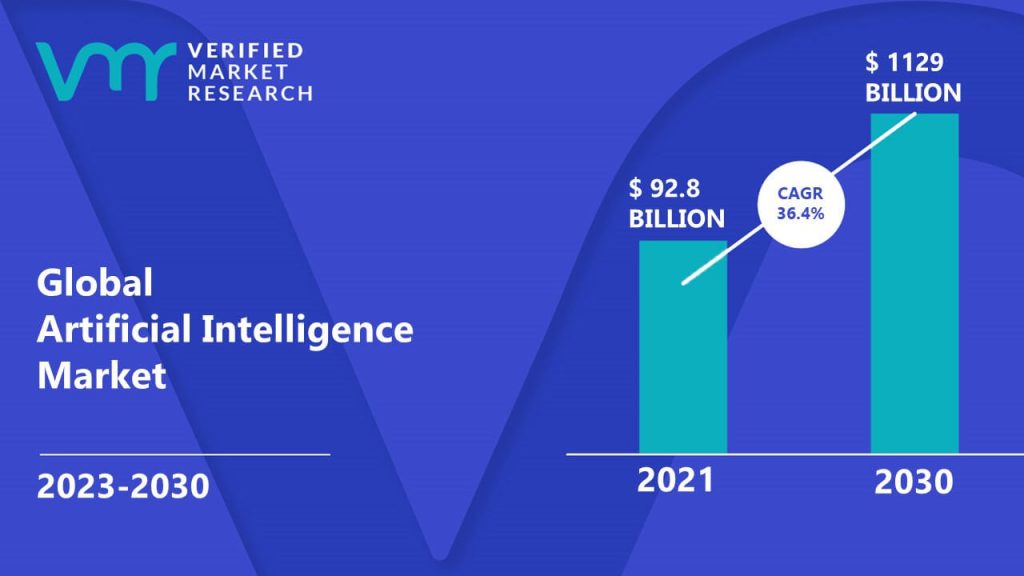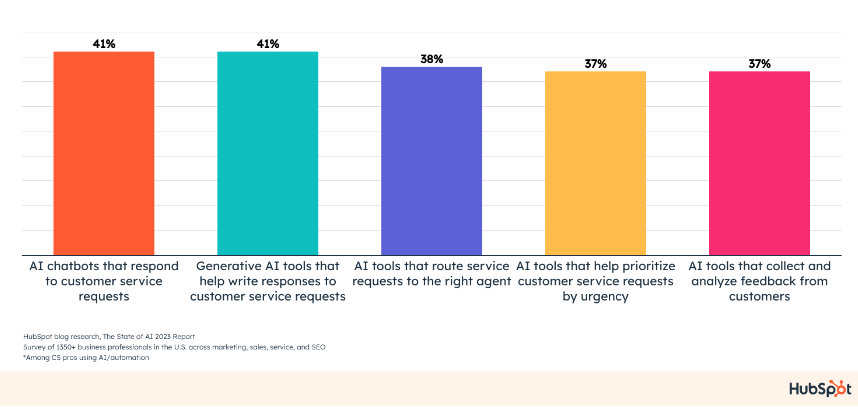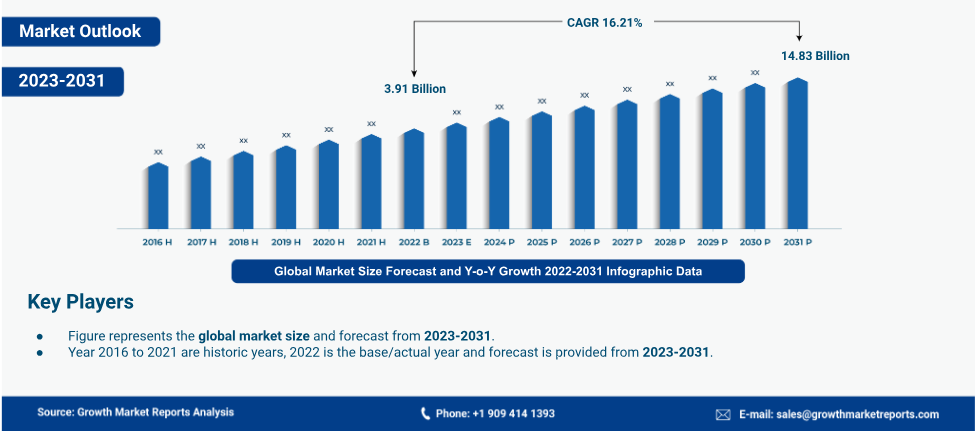Artificial Intelligence (AI) has come a long way, and its integration into businesses is becoming increasingly prevalent.
In 2021, the AI market was worth USD 92.8 Billion, and it’s expected to grow to USD 1129 Billion by 2030. This meteoric rise underscores the increasing prevalence and integration of AI into various business sectors.
Global Artificial Intelligence Market Size (From 2021 to 2030)

In this article, we will explore seven concrete ways AI is already making a significant impact on businesses today.
Improved Customer Service
AI-powered chatbots and virtual assistants are revolutionizing customer service. These intelligent systems can provide 24/7 support, answer frequently asked questions, and assist with problem-solving.
The newest HubSpot report highlights the effectiveness of AI chatbots in answering customer service questions. These AI chatbots not only work exceptionally well but are also cost-effective, ensuring consistent and prompt responses, leading to improved customer satisfaction
Following closely are AI tools that facilitate routing requests to the right person and those that assist in composing responses to service questions.
Most Popular AI Automation Tools in Customer Service (As of 2023)

The growing adoption of these AI technologies is transforming the customer service domain, optimizing operational processes, and improving the overall customer experience.
Personalized Marketing Campaigns
AI algorithms can analyze vast amounts of customer data to create highly personalized marketing campaigns. They analyze user behavior and preferences, enabling AI to suggest products or services that align better with individual customers’ interests.
Consider an online store scenario. AI can observe what a customer has browsed or purchased in the past. The next time that customer visits, AI can present them with similar items right on the homepage, crafting a personalized shopping journey that may encourage them to buy more.
Also, AI helps businesses put their ads where they will do the most good. It looks at where and when past ads did well and uses that info to pick the best spots for future ads.
This means ads are more likely to be seen by the right people, at the right time, making it more likely that they will draw customers in.
Identity Verification
With the increasing prevalence of online threats and identity theft, it’s becoming standard for businesses to implement identity verification to protect their operations and the data of their customers. So, services like iDenfy, which provide identity verification, are becoming increasingly popular.
Moving forward with technological advancements, AI introduces an extra layer of security and efficiency to this vital area. It employs facial recognition, document checks, and biometric analysis to validate user identities, safeguarding both businesses and users during online engagements.
Real-Life Example
Take the case of Airbnb, a popular online platform for lodging and tourism experiences. With millions of users worldwide, ensuring the authenticity of both hosts and guests is vital.
To strengthen trust and safety, Airbnb employs AI-driven identity verification processes. When a user signs up or makes a reservation, they may be asked to provide a government ID or take a selfie.
AI algorithms then cross-check the provided ID with the selfie to ensure the person is genuine. This process not only verifies the identity of users but also deters potential fraudsters from creating fake profiles or engaging in deceptive practices.
⚡ Learn more ➡️ AI’s Role in Strengthening Online Privacy
Streamlined Data Analysis
Data is essential for modern businesses, but handling large datasets can be challenging. AI-powered analytics tools make it easier to process and understand data, providing insights for better decision-making.
They help businesses in several ways:
- Data Processing: AI-powered analytics tools quickly handle and make sense of data, even when it’s extensive.
- Insight Generation: They find useful information that helps with decision-making.
- Identifying Trends: AI assists in spotting trends and predicting market changes, which helps with making decisions ahead of time.
- Improving Operations: AI-driven data analysis allows businesses to optimize their everyday processes.
- Risk Assessment: AI helps businesses identify and manage potential problems.
- Detecting Fraud: AI is also useful for spotting fraudulent activities, making businesses more secure.
HR Management
The role and growth of artificial intelligence (AI) in human resources (HR) have been notably significant.
In 2022, the global AI in HR market size was nearly USD 3.91 billion and it’s projected to reach USD 14.83 billion by 2031, expanding at a yearly growth rate of 16.21% from 2023 to 2031.
Global AI in HR Market Size (From 2016 to 2031)

This substantial growth is attributed to AI’s capability to automate various HR processes, which are traditionally time-consuming and resource-intensive. AI can automate various aspects of HR, from screening resumes to conducting initial interviews.
It can also aid employee retention through data analysis to identify potential attrition risks and to suggest improvement strategies.
AI-driven tools also assist in workforce planning, helping businesses match the right talent with their strategic goals. Even meeting recording tools (e.g. Claap) now use AI to streamline documentation, automatically transcribing and summarizing discussions. Similarly, analytics platforms also use AI to assist in planning, predicting turnover, and spotting skill gaps.
Supply Chain Optimization
AI plays a pivotal role in optimizing supply chain management. It can predict demand, optimize inventory levels, and streamline logistics, ultimately reducing costs and minimizing delays.
Machine learning algorithms can analyze historical data to identify patterns and make real-time adjustments to supply chain operations.
Imagine you have a business that sells different items. Some items sell well all year, and some sell more during special times, like holidays.
- Predicting Demand: AI looks at what sold well in the past, like certain items selling a lot during Christmas. It helps you get ready, tells you to make more of those items before the holidays start, and helps make sure you have what customers want without rushing at the last minute.
- Optimizing Inventory: AI does more than just guess what will sell. It also helps you manage your stock in a smart way. For example, if one item starts selling a lot in the summer, AI lets you know to make more and helps you order the stuff you need to make them, so you don’t miss out on sales.
- Streamlining Logistics: AI also helps make sure your items get to your customers well. If a delivery truck usually takes a certain route but there’s a big traffic jam, AI can change the route on the spot, helping the delivery stay on time as much as it can.
In this way, AI makes both the management and operation of supply chains more straightforward and impactful, keeping businesses running smoothly and customers happy.
Predictive Maintenance
Businesses with lots of machinery know that unexpected breakdowns can be expensive and disruptive. AI helps avoid these surprises by keeping a close eye on all equipment, all the time.
It uses sensors to collect data like temperature and vibration from machines and then analyzes this data to spot any signs that something might go wrong soon.
When AI notices something unusual, it can predict possible issues and let the maintenance team know that a machine needs attention. This means the team can fix problems before they cause a breakdown, making sure work can go on without interruptions.
This approach not only saves money on emergency repairs but also helps machines last longer, providing a steady and reliable production flow.
The Future Role of AI in Business
In summary, AI’s impact on businesses is already evident, and its future prospects are even more promising.
As the AI market continues to grow exponentially, it’s clear that AI will play a pivotal role in reshaping business operations and strategies.
With its potential to revolutionize customer service, marketing, data analysis, security, and various other domains, AI is set to define the future of business in an era marked by intelligence and innovation.
⬇️Further Reading:

